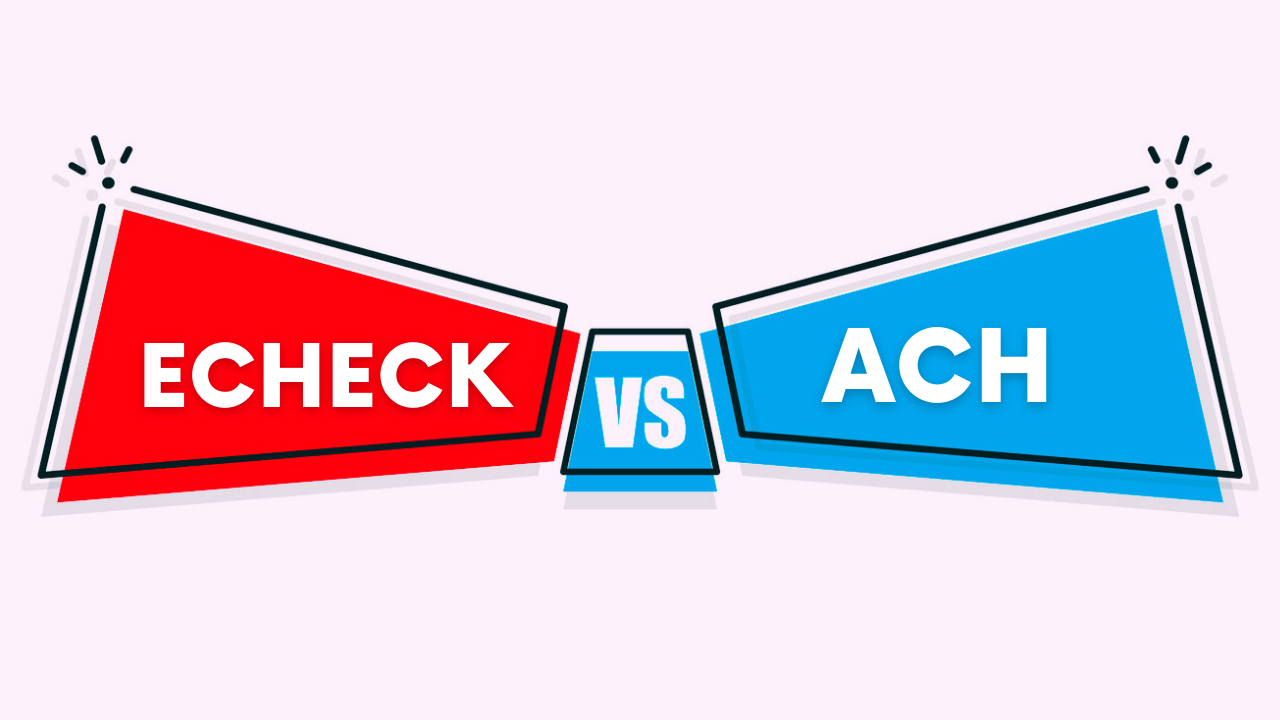
| September 30th, 2023 |
eCheck vs. ACH — Key Differences Simplified!
In the realm of digital payments, two terms often come up: eCheck and ACH. While they might seem interchangeable at first glance, they serve distinct purposes in the world of electronic transactions. In this guide, we’ll demystify the differences between eCheck and ACH payments. By the end, you’ll have a clear understanding of how they work, their advantages, and when to use each for seamless financial transactions.
What is an eCheck?
Let’s begin with eChecks. An electronic check, or eCheck, is a digital version of a traditional paper check. It enables individuals and businesses to transfer funds from one bank account to another electronically. Instead of writing a physical check, eChecks facilitates the entire process digitally, making transactions more efficient and environmentally friendly.
What Is ACH?
ACH stands for Automated Clearing House. It’s a network that connects financial institutions and facilitates electronic money transfers in the United States. ACH payments can take various forms, including direct deposits, direct payments, and eCheck payments. Essentially, eChecks are a type of ACH payment, but not all ACH payments are eChecks. Confused yet? Don’t worry; we’ll clarify.
Key Differences: eCheck vs. ACH —
Now that we’ve introduced both terms, let’s break down the key differences between eCheck and ACH payments:
1. Initiation:
- eCheck: EChecks are typically initiated by individuals or businesses. When you use your online banking or a payment processing platform to create a digital check and send it electronically, you’re using an eCheck.
- ACH: ACH payments can be initiated by both individuals and businesses, but they are often associated with recurring transactions like direct deposits, bill payments, and automatic transfers. Companies can also use ACH for payroll and vendor payments.
2. Transaction Types:
- eCheck: EChecks are a specific type of ACH payment that mimics the functionality of a paper check, including the need for payee authorization and account and routing numbers.
- ACH: ACH encompasses a broader range of electronic transactions, including direct deposits, direct payments, wire transfers, and eChecks. It serves as the backbone for various electronic fund transfers.
3. Authorization:
- eCheck: EChecks require explicit authorization from the payee (the person or business receiving the payment). This authorization often involves providing bank account and routing numbers.
- ACH: ACH payments may or may not require payee authorization, depending on the transaction type. For example, recurring payments like subscription fees typically require authorization, while direct deposits to employees’ bank accounts usually do not.
4. Use Cases:
- eCheck: EChecks are commonly used for one-time payments, such as online purchases or bill payments. They are suitable for scenarios where payee authorization is necessary.
- ACH: ACH payments are versatile and can handle various transaction types, making them ideal for direct deposits, recurring bill payments, and large-scale financial transactions between businesses.
5. Transaction Speed:
- eCheck: EChecks typically take a few business days to clear and settle, similar to traditional paper checks. The processing time can vary depending on bank policies and payment processing services used.
- ACH: ACH payments, including eChecks, are designed for efficiency. They generally clear faster than paper checks but may still require a day or two for processing.
Advantages of eCheck and ACH Payments —
Now that we’ve dissected the differences, let’s explore the advantages of both eCheck and ACH payments:
Advantages of eCheck Payments:
- Cost-Effective: EChecks are more cost-effective than paper checks, as they eliminate the need for paper, postage, and processing fees.
- Secure: EChecks uses encryption and authentication protocols, ensuring the security of sensitive financial information.
- Familiarity: EChecks mimic the traditional check-writing process, making them a familiar and comfortable payment method for many.
Advantages of ACH Payments (Including eChecks):
- Efficiency: ACH payments, including eChecks, streamline financial transactions, reducing manual work and processing time.
- Convenience: ACH payments are versatile and can accommodate various transaction types, from direct deposits to recurring bill payments.
- Environmental Impact: Both eChecks and ACH payments contribute to a more eco-friendly approach to payments by reducing paper usage.
When to Use eCheck or ACH Payments —
Now that you understand the distinctions and advantages of eCheck and ACH payments, here’s when to use each:
- Use eChecks when: You need to make one-time payments or transactions where payee authorization is required. EChecks are suitable for scenarios where you want to replicate the traditional check-writing process in a digital form.
- Use ACH payments (including eChecks) when: You have recurring transactions, such as payroll, subscription fees, or utility bill payments. ACH payments are efficient for handling routine financial operations and can save time and resources.
Conclusion —
In summary, eChecks and ACH payments play distinct roles in the world of electronic transactions. EChecks are a specific type of ACH payment that mimics traditional check writing and are suitable for one-time payments with payee authorization. ACH payments, on the other hand, encompass a broader range of electronic fund transfers and are ideal for recurring transactions and routine financial operations.
By understanding the differences between these payment methods and recognizing their respective advantages, businesses, and individuals can make informed decisions about which option best suits their specific transaction needs. Whether you opt for eChecks or other ACH payment types, you’re leveraging the efficiency and convenience of electronic transactions.
